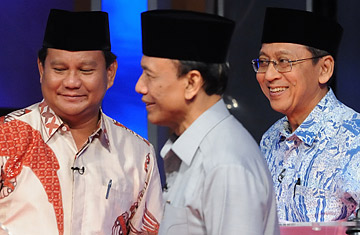
Vice-presidential candidates (from left) Prabowo Subianto, Wiranto and Boediono huddle together after a live debate at a local TV station in Jakarta
But some experts say the televised debates are little more than personality contests. "The candidates really need to sell themselves more than their policies," says Nurul Arifin, a recently elected MP from the Golkar party, the political group of former dictator Suharto. Nurul is supporting Wiranto, the ex-general running with Jusuf Kalla, the current Vice President who is aiming for the top job, but she failed to see a clear winner in the event. "People want to see more interaction, but the candidates are afraid that any attacks could come off as arrogant," she adds. The third candidate, ex–special forces commander Prabowo Subianto, also held back, despite his penchant for emotional rhetoric and lofty speeches. "In Indonesia, the parties have not translated their ideas into agendas," says Anies Baswedan, president of Paramadina University and moderator of the first presidential debate. "Most here assess less on what is said than how it was said."
Interest in the debates has been moderate, with between 35 million and 45 million viewers, or one-fourth of registered voters, per event. As with most maturing democracies, voter turnout has been dropping since Indonesia's first free elections in 2004. While still facing significant challenges, the country is more optimistic with greater freedoms than it had experienced in the past, particularly during the 32 years of authoritarian rule under Suharto, who was ousted from the presidency in 1998. The country is one of three in the region that is expected to post positive economic growth this year, and inflation is under control. "This election is not like in the U.S., when the mantra was for change," explains Baswedan. "Before you ask for change, you have to be dissatisfied, but if you are happy, you don't want to change." That, he says, is why the campaign of the Democratic Party of Yudhoyono (who is known here as SBY) has "Let's Continue" as its slogan, hoping that more people are content with their lot than they were five years ago.
With the presidential candidates of Yudhoyono, Kalla and former President Megawati Sukarnoputri preparing for their second round this week, many voters are left wondering if the extensively covered debates are really going to change any minds. With the exception of their economic policies, positions on issues ranging from education and health care to corruption and job creation have been presented in generalities — a flaw that some are blaming on the structure of the events themselves. "The debates won't change any opinions unless the format is changed and more details can be revealed," says Effendi Ghazali, professor of political communications at the University of Indonesia. "There are differences between the candidates, but they are not coming through in the debates — only in their ads."
Bigger changes are expected to come in five years, when the field is likely to be filled with new candidates and not figures from the New Order, as Suharto's regime was called. "All of the presidential candidates have been in office, so we know who they are," says Sandra Hamid, who handles governance issues at the Asia Foundation. "It is hard to know what they could tell people that will change their minds."
In April's legislative elections, SBY saw a decisive victory, winning 20.8% of the vote. Passing the 20% threshold gave Yudhoyono the freedom to choose his vice-presidential candidate without the consideration of formal coalition partners, allowing him to run with Boediono, a former central-bank governor and economics professor with minimal political baggage. With Kalla's Golkar party trailing with 14.4% and Sukarnoputri's Indonesian Democratic Party of Struggle with 14%, the two candidates have had to team up with former generals — with dubious human-rights records.
Those records, in both men's cases tarnished during the 1998 riots and the breakaway of East Timor the following year, is enough to convince some voters that SBY remains the best man for the job. "SBY may be a bit dull and is not about fiery rhetoric, but at least he has stood behind his principles," says Hidayat Jati, an executive in the media industry. "Even his in-law [former central banker Aulia Pohan] has been put in jail for corruption. People like seeing that the élite are no longer above the law."
With corruption, jobs, inflation, education and health care as the top five issues most Indonesians care about, SBY is the only candidate regularly polling above or near 50%, the threshold necessary to win in one voting round. Still, some polls — and it is difficult to know which surveys are unbiased and reliable — show the race getting closer. Failure to reach that will send the top two vote getters to a second round in September, something the incumbent and front runner would probably like to avoid. "The question now is whether it is better for SBY to win with a slight margin in one round or a stronger mandate after two rounds," says Hamid. The answer to that question is just two weeks away.
